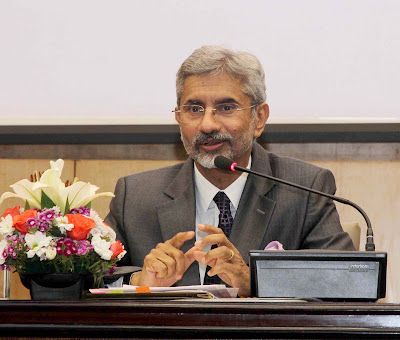In the midst of growing unease in their ties, India today asked China to respect its territorial sovereignty and said its ascent should not be seen as a threat to China's rise.
Foreign Secretary S Jaishankar also criticised Pakistan for "blocking" SAARC, saying the regional grouping has become "ineffective" due to insecurity of one member nation. Calling terrorism the most "pervasive and serious" threat to international security, he rued lack of coherence in dealing with the menace globally, adding pressures to reform the UN so that it can deal with major challenges effectively will only grow with each passing day.
Talking about the China-Pakistan-Economic Corridor (CPEC) which passes through Pakistan occupied-Kashmir, Jaishankar, addressing the Raisina Dialogue, envisioned as the country's flagship conference on geopolitics and geo-economics, said China should respect India's territorial sovereignty as Beijing was "very sensitive" to matters relating to its own sovereignty. "China is a country which is very sensitive on matters concerning its sovereignty. So we would expect that they would have some understanding of other people's sensitivity on their sovereignty," he said, noting there was no sign of any reflection on India's concerns over CPEC project.
The Foreign Secretary's comments came a day after Prime Minister Narendra Modi, in a clear message to China, said both sides should show sensitivity and respect for each other's core concerns and interests. Modi had yesterday said only by respecting the sovereignty of countries involved, can regional connectivity corridors fulfil their promise and avoid "differences and discord".
"What we are trying to do is to convince China that our rise is not harmful to China's rise just as China's rise need not be to India's rise," Jaishankar told the gathering.
Referring to Donald Trump's election, the Foreign Secretary said relations between the US and Russia could undergo a major transformation not seen since 1945 and that its impact was hard to predict.
In this context, he said India's relations with both the US and Russia were on an upswing and an improvement in US-Russia ties was not against Indian interests.
On overall ties with China, Jaishankar said there has been broadening of cooperation, especially in areas of business and people-to-people contacts, but these have been "overshadowed" by differences on certain political issues. He said China's power and its expression remain a dynamic factor in Asia.
Some chill have set in Sino-India ties following China's opposition to India's bid for Nuclear Suppliers Group (NSG) membership as also after Beijing blocked India's move at the UN to designate Masood Azhar a global terrorist. On terrorism, Jaishankar said ways to deal with the threat was major focus of India's diplomacy, adding "terror is a snake that bites the hand that feeds it." Talking about SAARC, Jaishankar said, "We hoped to partially remedy this (Pakistan's obstuction) through the BBIN (Bangladesh, Bhutan, India, Nepal) sub-regional grouping. "It is also our expectation that the current level of enthusiasm among members of BIMSTEC can be channelled towards more far-reaching initiatives."
The Bay of Bengal Initiative for Multi-Sectoral Technical and Economic Cooperation (BIMSTEC) grouping comprises India, Myanmar, Sri Lanka, Thailand, Bhutan, Nepal and Bangladesh. Jaishankar said Asia is facing a host of challenges including emerging multipolarity, heightened nationalism and disputed boundaries, among others. Referring to the Indian establishment's possible equation with the Trump administration, Jaishankar said, "We established early contact with the Trump transition team and see a strong convergence of interests and concerns." During the interactive session, Jaishankar touched upon a vast array of subjects concerning international relations, but his major focus was China and how the role of "plurilaterals" in India's foreign policy has grown steadily in the last few years. He said India is now "well positioned" to take a lead in combating terrorism.
Jaishankar said both China and India have opened up significantly since 1945, adding "if China had not opened up the international order the way it did, I think it would be much harder today for India also to exploit those phases." On South China Sea dispute, the Foreign Secretary said India's position was consistent with the international law and its overall stand on it in sync with the international community. Stressing on reforming the UN, he called an "absurdity" the global body's failure to reform itself.
"The absurdity of the main multilateral decision making body being more than 70 years old and due for retirement anywhere in the world is obvious to all except those with a vested interest. "There can be no getting away from the myriad of global challenges that will eventually require a credible multilateral response. The pressures to reform the UN will only grow with each passing day," he said. Talking about geopolitical issues, he said the world in 2017 is marked by "unevenness, possibilities and uncertainties" and that the US seemed ready to change the terms of its engagement with the world.
On issues facing the western world, he said voices of interdependence and globalisation have become more muted and optimism that trade and investment would overcome political divides has also faded. "More dangers than convenience are perceived from connectivity. And there is a lack of purpose in confronting global challenges like terrorism, though some important exceptions should be acknowledged. "The world has not just got flatter. Suddenly, one part of it is also more inward looking; in some ways, more tired," he said. On Afghanistan, the Foreign Secretary said India stands by the Afghan government and will do its "utmost" to strengthen President Ashraf Ghani's dispensation.






















